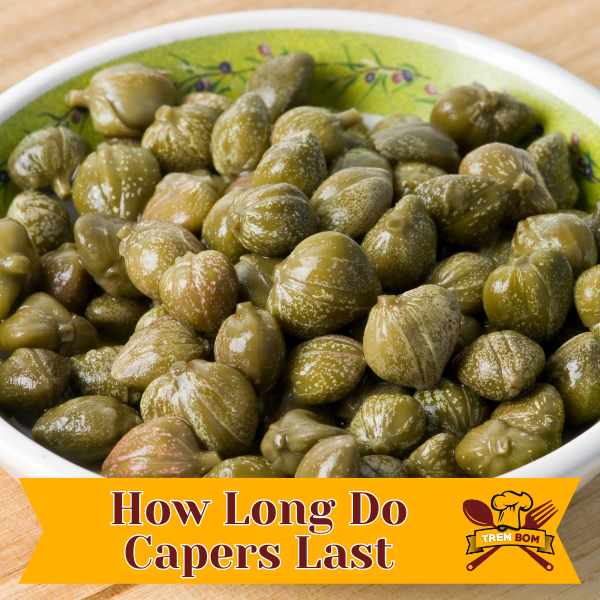
Capers are a popular ingredient in many recipes, known for their tangy and briny flavor. If you’ve ever wondered how long capers can last in your pantry or fridge, you’ve come to the right place. In this article, we will explore the shelf life of capers and provide helpful tips on storing them to maintain their freshness. Whether you’re a fan of capers in salads, pasta dishes, or sauces, it’s important to know how to properly store them to ensure their optimal flavor. Let’s dive in and learn all about the shelf life of capers.
Key Takeaways:
- Capers can last up to 2-3 years beyond their expiration date when stored in a cool and dark place.
- Once opened, capers can last for about 1-2 years when stored in the refrigerator.
- Proper storage methods include transferring capers into an airtight container and keeping them submerged in the brine or liquid they come in.
- Signs that capers have gone bad include a foul odor, mold growth, or a change in texture or taste.
- If the brine becomes foul-smelling or shows signs of mold growth, it’s best to discard the capers.
Understanding Capers: An Overview
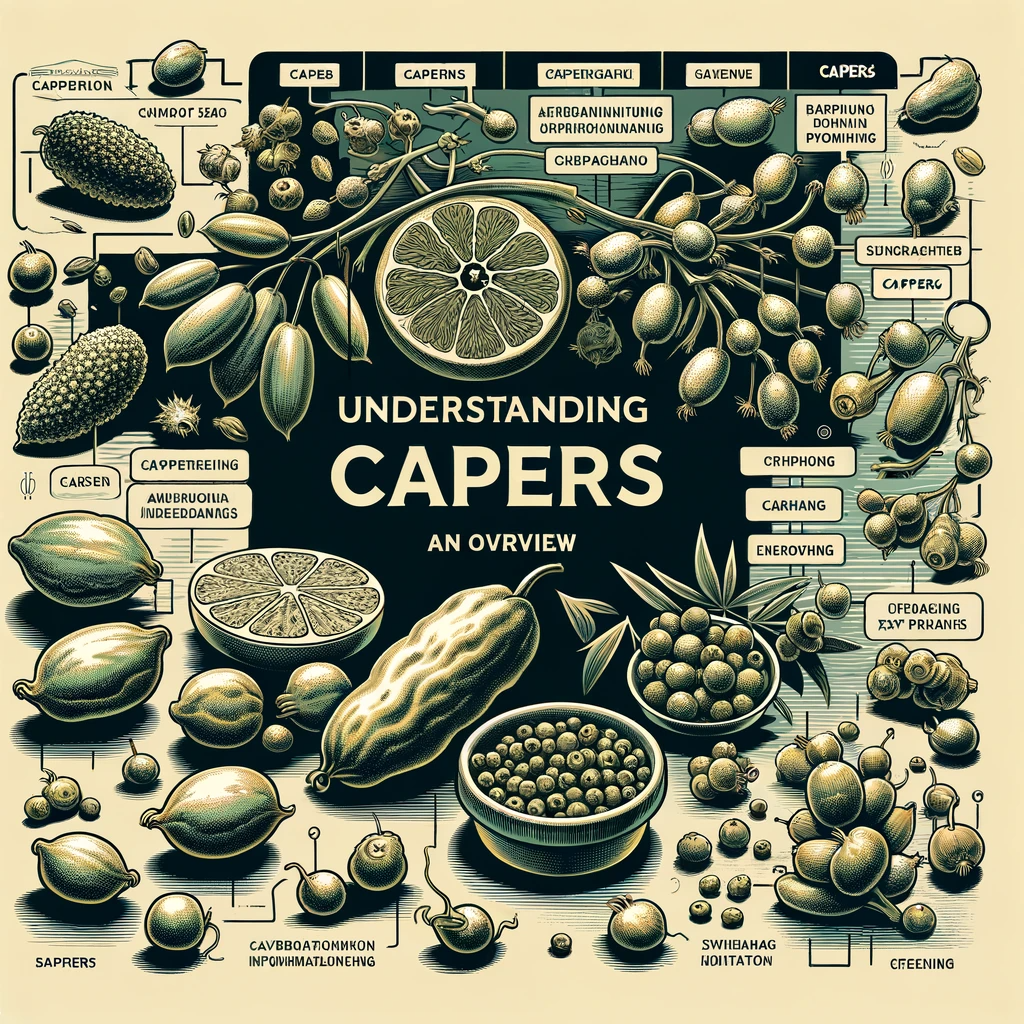
Capers are the unopened flower buds of the Capparis spinosa, a perennial bush native to the Mediterranean region. These small, round buds are harvested by hand before they mature into flowers. Capers have been used in cooking for centuries and are commonly found in Mediterranean and French cuisine. They add a unique tangy and salty flavor to various dishes and are often used as a garnish or ingredient in sauces, salads, pasta dishes, and more.
What Are Capers?
Capers are the edible flower buds of the Capparis spinosa plant. These buds are harvested before they have a chance to bloom into flowers, giving them their distinct flavor. Capers are known for their tangy and briny taste, which adds a flavorful punch to many dishes. They have a firm texture and are typically green in color, although some may have a slightly reddish hue.
Commercially Produced Capers
Commercially produced capers are readily available in stores and are typically sold in jars or cans. These capers are often packed in brine or salt to preserve their freshness. The brine or salt helps enhance the flavor and texture of the capers while also extending their shelf life. When purchasing commercially produced capers, it’s important to check the label for any additional ingredients or additives that may be present.
The Shelf Life of Capers
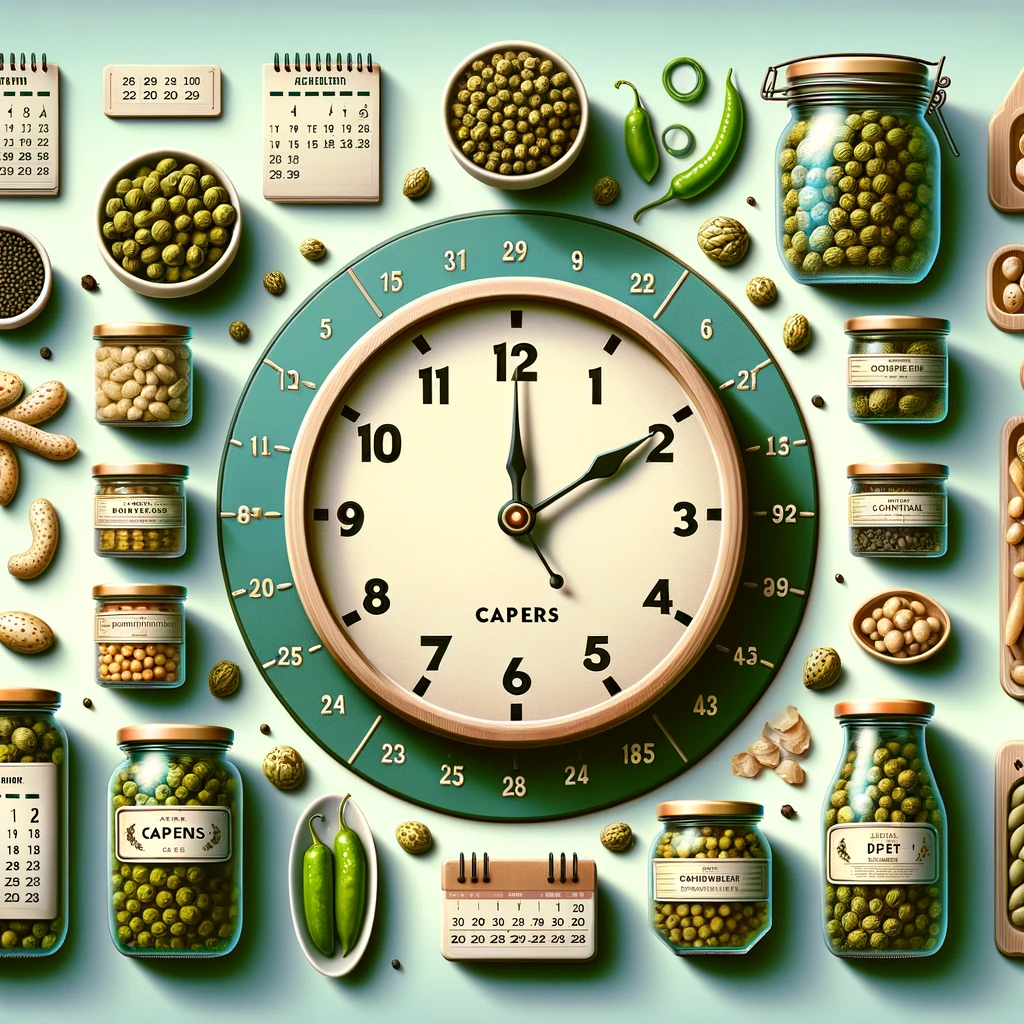
When it comes to capers, understanding their shelf life is essential for maintaining their quality and flavor. The shelf life of capers can vary depending on several factors, including storage conditions, caper quality, and the presence of preservatives in commercially produced capers. In this section, we will explore how long capers typically last and the factors that can affect their shelf life.
How Long Do Capers Last?
Unopened jars of capers have a long shelf life if stored properly. On average, unopened capers can last up to 2-3 years beyond their expiration date when stored in a cool and dark place, such as a pantry or cupboard. The brine or liquid in which the capers are packed helps preserve their freshness over time.
However, once the jar is opened, the shelf life of capers significantly reduces. Opened jars of capers can last for about 1-2 years when stored in the refrigerator. It’s important to keep them in a sealed container to prevent drying out and maintain their flavor.
Factors Affecting the Shelf Life of Capers
Several factors can affect the shelf life of capers:
- Storage conditions: Proper storage is crucial for preserving the freshness of capers. Storing them in a cool and dark place, such as a refrigerator, helps extend their shelf life.
- Caper quality: The quality of capers plays a role in determining their shelf life. Fresh, high-quality capers are more likely to last longer compared to capers of lower quality.
- Presence of preservatives: Some commercially produced capers may contain preservatives, such as citric acid, to prolong their shelf life. These preservatives can help extend the expiration date of capers.
By considering these factors and following proper storage practices, you can ensure that your capers last as long as possible, allowing you to enjoy their tangy flavor in your favorite dishes for an extended period.
Storing Capers for Maximum Freshness
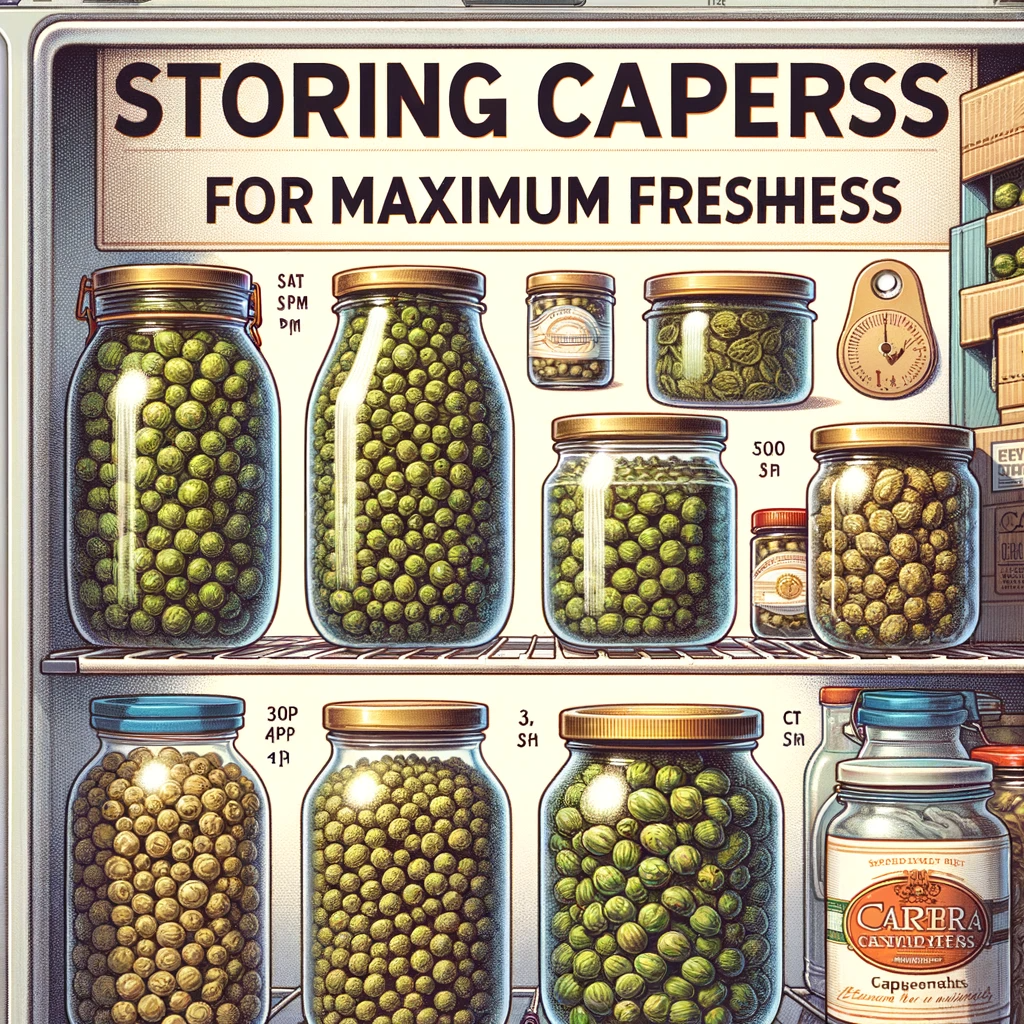
Proper Storage Methods
To ensure the maximum freshness and flavor of your capers, it is important to store them properly. After opening a jar of capers, it is best to transfer the remaining capers along with the brine or liquid into an airtight container. This will help preserve their taste and prevent them from drying out.
The sealed container should be stored in the refrigerator, ideally at a temperature between 34°F and 39°F (-1°C and 4°C). This cool temperature will slow down the degradation process and help extend the shelf life of the capers.
Signs That Capers Have Gone Bad
Signs that capers have gone bad include a foul odor, mold growth, or a change in texture or taste. If you notice any of these signs, it’s best to discard the capers.
| Signs of Spoiled Capers | Description |
|---|---|
| Foul Odor | If the capers emit an unpleasant or rotten smell, they have likely spoiled. |
| Mold Growth | Visible mold on the capers or in the liquid indicates spoilage. |
| Change in Texture | If the capers become mushy, slimy, or have an unusual texture, they should be discarded. |
| Change in Taste | If the capers have a significantly different or off-putting taste, they have gone bad. |
It’s important to regularly check the condition of your capers to ensure they are still fresh and safe to consume. If in doubt, it’s always better to err on the side of caution and discard any capers that show signs of spoilage.
Extending the Life of Your Capers
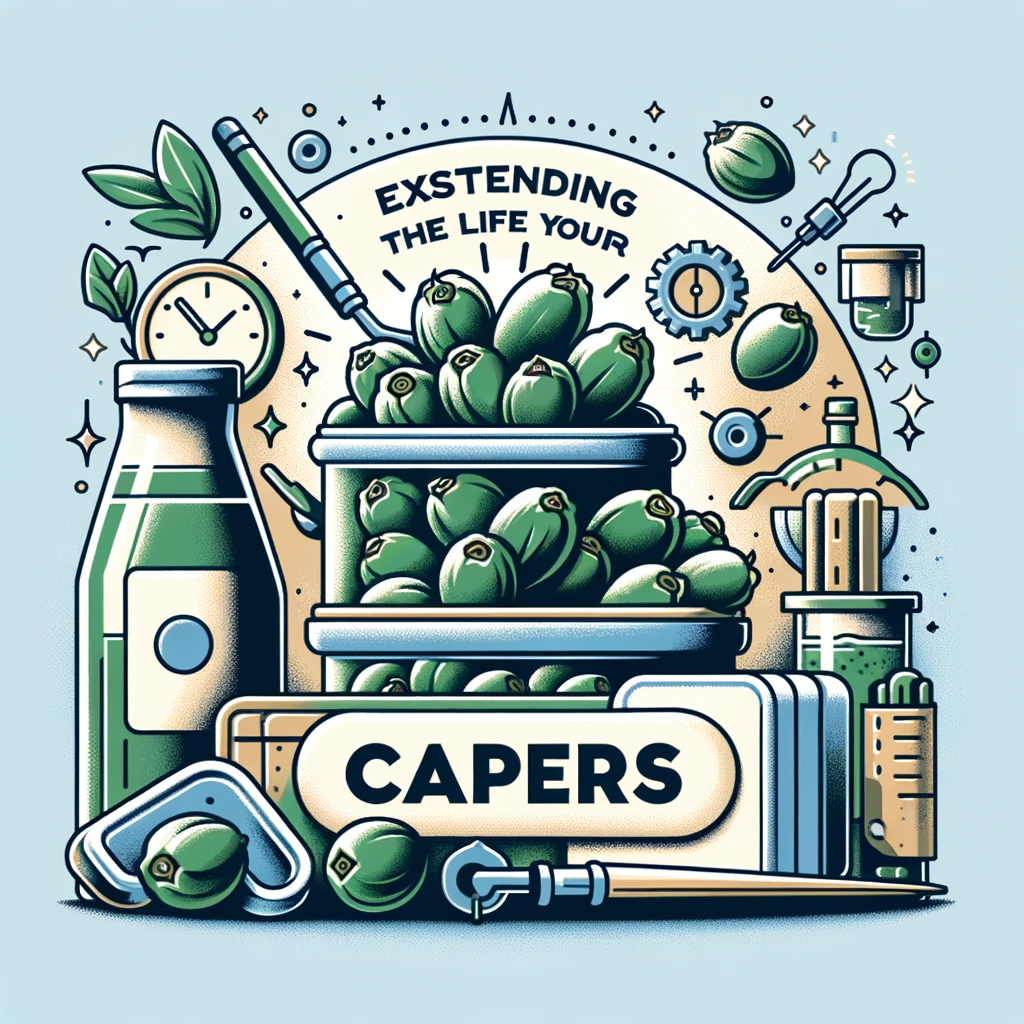
If you want to extend the shelf life of your capers even further, there are a few tips you can follow.
- Always use clean utensils when scooping capers from the jar to prevent any contamination.
- Keep the capers submerged in the brine or liquid they come in to help preserve their freshness and flavor.
The role of brine in preservation is crucial for capers. The brine acts as a natural preservative, helping prevent the growth of bacteria or mold. It keeps the capers moist and enhances their flavor. While the brine may darken over time or develop a cloudy appearance, this is normal and does not necessarily indicate spoilage. However, if the brine becomes foul-smelling or shows signs of mold growth, it’s best to discard the capers.
When to Discard Capers
Recognizing Spoiled Capers
It’s essential to know when to discard capers to avoid consuming spoiled or unsafe food. Some signs that capers have gone bad include:
- A foul odor
- Mold growth
- A slimy texture
- A significant change in taste
If you notice any of these signs, it’s best to err on the side of caution and discard the capers.
Understanding Expiration Dates
Additionally, understanding expiration dates is crucial when it comes to consuming capers. While the expiration date provides a general guideline for the shelf life of the capers, it’s important to use your senses and judgment to determine their freshness. Always check the appearance, smell, and taste of the capers before consuming them, regardless of the expiration date.
| Signs of Spoiled Capers | Action to Take |
|---|---|
| Foul odor | Discard capers |
| Mold growth | Discard capers |
| Slimy texture | Discard capers |
| Significant change in taste | Discard capers |
How Long Do Capers Last FAQ
This FAQ section addresses some common questions about the shelf life and storage of capers.
How do you know if capers have gone bad?
Look for signs such as mold growth, a foul odor, or a slimy texture.
How long do capers last once the jar is opened?
When stored in the refrigerator, opened capers can last for about 1-2 years.
What is the white stuff on capers?
The white stuff, often seen as crystals, is harmless and can form due to the salt present in capers.
How long are capers good for after opening?
Capers can be good for up to a year after opening if stored properly in the fridge.
Do capers expire in the fridge?
While capers may still be safe to consume after the expiration date, their quality and flavor may deteriorate.
Can you get food poisoning from capers?
While the risk is low, it’s always important to ensure capers are stored and handled properly to avoid any potential contamination.
Should capers always be rinsed?
Rinsing capers can help remove excess salt and brine, but it’s a matter of personal preference.
FAQ
How do you know if capers have gone bad?
Look for signs such as mold growth, a foul odor, or a slimy texture.
How long do capers last once the jar is opened?
When stored in the refrigerator, opened capers can last for about 1-2 years.
What is the white stuff on capers?
The white stuff, often seen as crystals, is harmless and can form due to the salt present in capers.
How long are capers good for after opening?
Capers can be good for up to a year after opening if stored properly in the fridge.
Do capers expire in the fridge?
While capers may still be safe to consume after the expiration date, their quality and flavor may deteriorate.
Can you get food poisoning from capers?
While the risk is low, it’s always important to ensure capers are stored and handled properly to avoid any potential contamination.
Should capers always be rinsed?
Rinsing capers can help remove excess salt and brine, but it’s a matter of personal preference.






